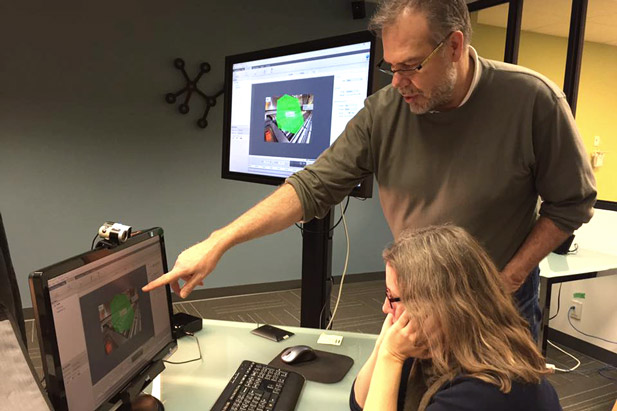Crossing a new line in the digital technology sandbox
UOIT Education researchers present award-winning paper on online learning
August 11, 2016

From how we communicate to how we make purchases, rapid changes in digital technology heavily influence our daily lives. It stands to reason then, that advances in technology can similarly influence how humans learn.
“Education is a fundamental human right,” says Roland van Oostveen, PhD, Associate Professor in the Faculty of Education (FEd) at the University of Ontario Institute of Technology (UOIT). “In today’s world, even before they have mastered their ABCs, most youngsters arrive at primary school with substantial capacity to engage technology. The question is how the education system and teaching pedagogies are changing with the times.”
Dr. van Oostveen and a team research colleagues co-authored an award-winning paper outlining how online environments provide accessible learning opportunities, where learners can also be teachers and teachers can also be learners. The research was recognized at the Association for the Advancement of Computing in Education’s (AACE) 2016 World Conference on Educational Media and Technology in Vancouver, British Columbia.
Co-authors of New conceptions for digital technology sandboxes: Developing a Fully Online Learning Communities (FOLC) model:
- Wendy Barber, PhD, Assistant Professor, UOIT Faculty of Education
- Todd Blayone, Graduate Researcher, UOIT Faculty of Education
- Maurice DiGiuseppe, PhD, Assistant Professor, UOIT Faculty of Education
- Roland van Oostveen, PhD, Associate Professor, UOIT Faculty of Education
- Elizabeth Childs, Royal Roads University, Victoria, British Columbia
The authors conclude a dynamic and vibrant online learning community can have a democratizing effect on their participants.
“One of the most compelling attributes of an online community is its inherent capacity for dynamic evolution,” says Dr. Maurice DiGiuseppe. “In other words, so long as students and faculty are present and engaged, the community will change according to its needs.”
“Participants in an online community shape the community in ways that respond to their specific needs,” says Dr. Wendy Barber. “To become effective learners, people need to be able to find their own learning path. They cannot rely on education providers alone, because their needs are too many and too varied.”
In keeping with the research theme, the group presented its paper live via webcam from multiple locations: in Oshawa (Barber and Blayone); London, U.K. (Childs, at Heathrow Airport) and Toronto (DiGiueseppe). The only team member physically at the Vancouver conference was Dr. van Oostveen.
“We used a virtual room in Adobe Connect, a browser-based audio/video conferencing site available through the office of the university’s Vice-President, Academic,” says Dr. Elizabeth Childs. “This site supports the university’s online programs such as the Bachelor of Arts in Educational Studies and Digital Technology, Bachelor of Allied Health Sciences, and the Master of Education / Master of Arts in Education and Digital Technology.”
Related link:



